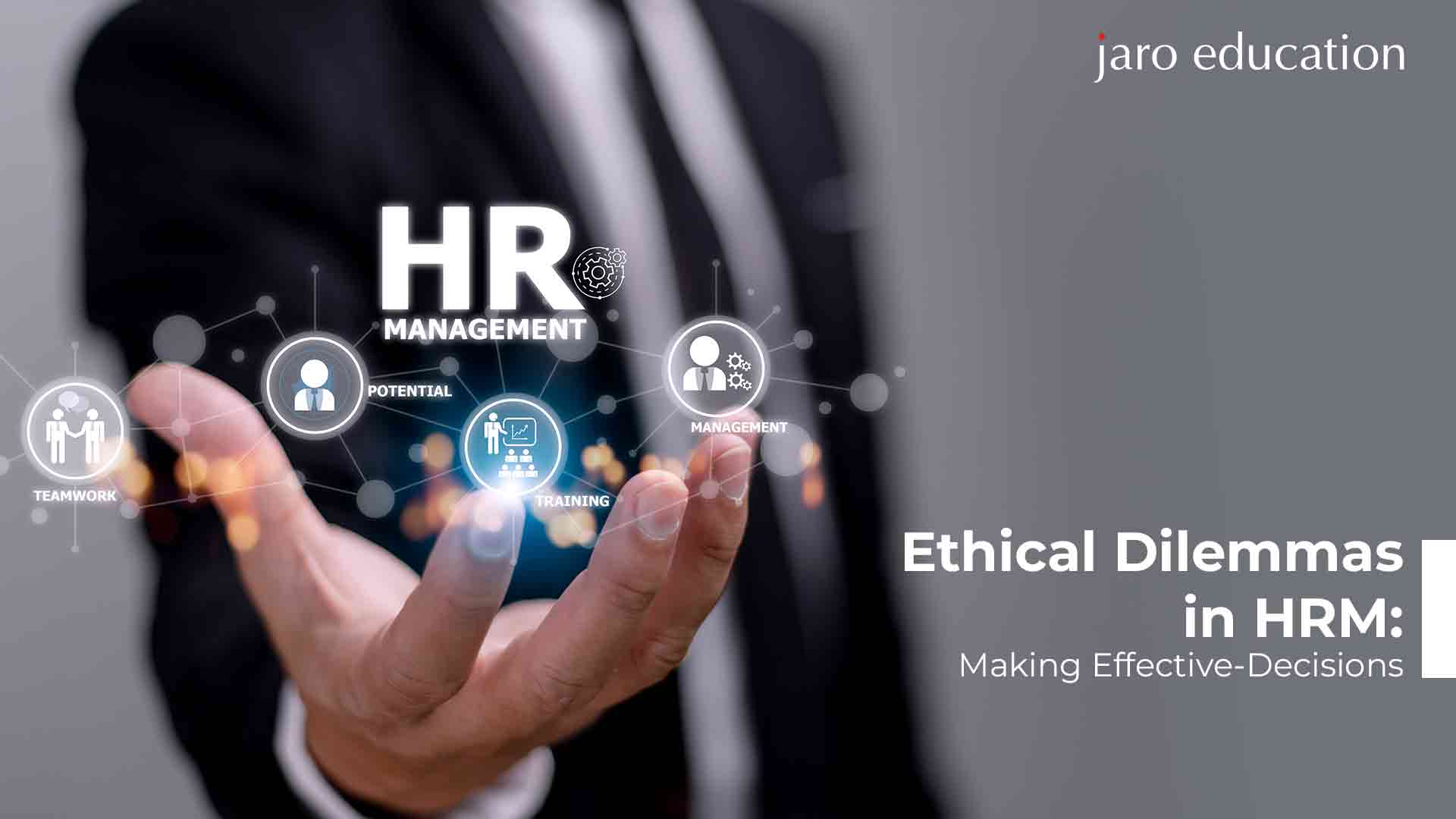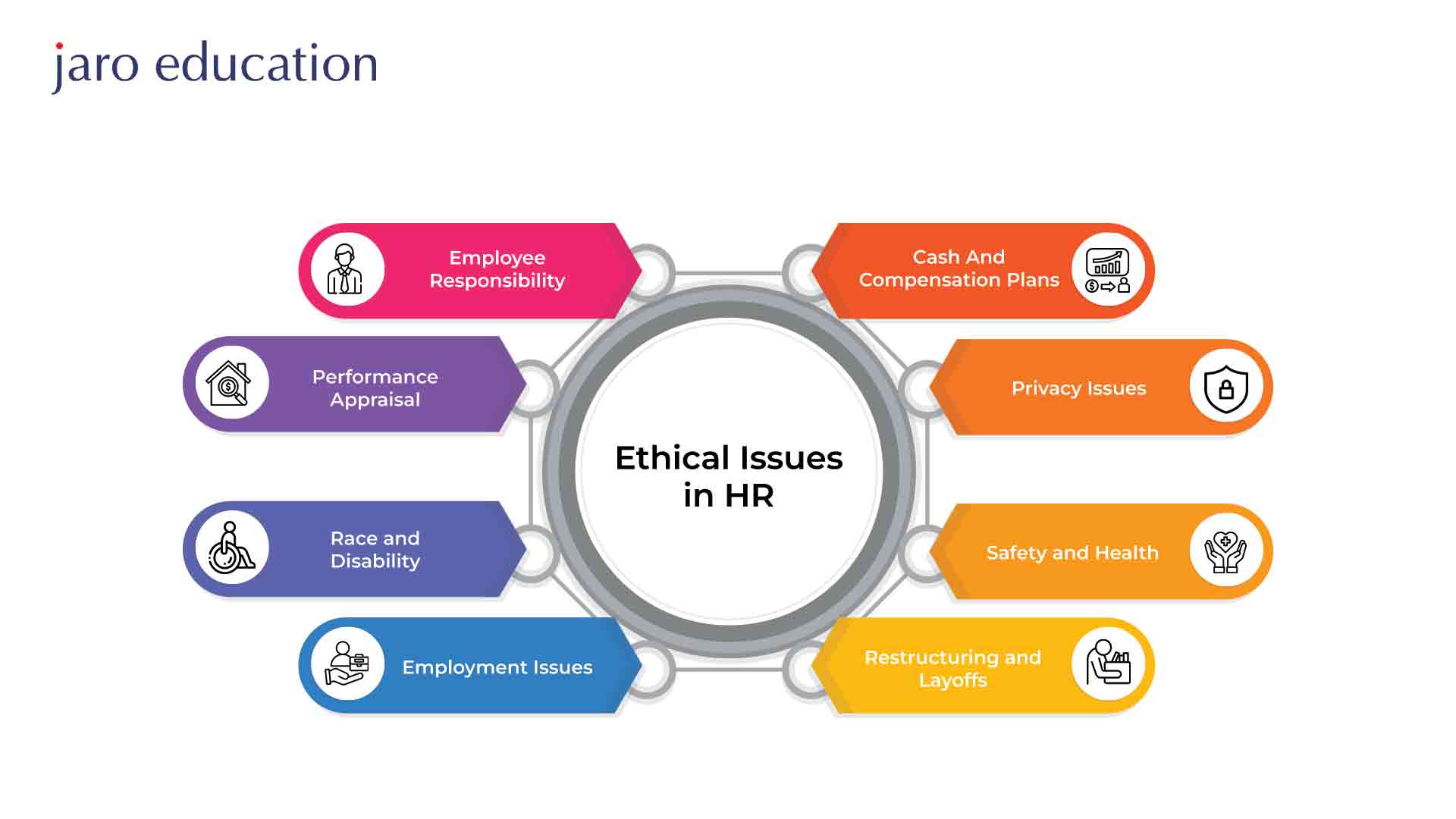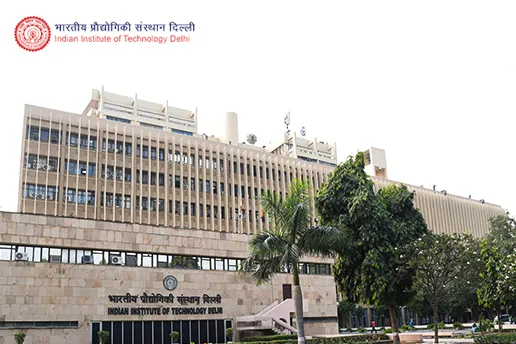
Managing relationships between groups of people is one of the core responsibilities of the corporate function known as human resources. Inevitably, this process may prompt inquiries regarding the obligations and privileges that each participant in this relationship has. Standards, values, morality, and ethics have grown more nuanced in postmodern society, where tolerance and ambiguity have replaced absolutes.
The ethical issues in HR are a complicated and persistent topic that needs critical thought and moral judgment. You can explore the complexities of ethical issues in Strategic HRM, Performance Management, HR Analytics, and more with the Executive Programme in Human Resource Management by CEP, IIT Delhi. Gain the knowledge and skills needed to make ethical HR decisions, fostering a workplace culture built on integrity, trust, and fairness. Elevate your HR career while upholding ethical standards.
Table of Contents
Exploring Ethical Issues in Human Resource Management
Planning and the growth of a company’s employees are the main areas of attention for HR decision -making. Due to its interaction with people, it is conceivably the area of management where ethics is of prime importance.
Since markets dictating corporate interests could put people at risk, one group of thought leaders highlights the significance of ethics in HR. They contend that because norms, standards, and processes have not been created, markets may take advantage of human capital by prioritising profits over stakeholder interests. This viewpoint emphasises the significance of HR ethics.
However, some neoliberal ethicists argue that corporate ethics are only concerned with maximising the use of human resources to increase profits. They contend that through utilising the potential of human resources, more value is created for companies, shareholders, and society at large, indirectly benefiting employees as key players in these organisations.
Regulations or processes cannot completely manage or coordinate markets for the improvement of human well-being since markets do not by themselves have an intrinsic ethical or unethical nature. The need for such regulations and processes cannot be denied or ignored, as human progress remains the ultimate objective of all human endeavours.

Common Ethical Issues in HRM
The increasing workplace diversity has intensified the challenge of preventing discrimination. HR managers must promote inclusivity and ensure that all employees are treated fairly. Here are some common ethical issues in human resource management:
Selection and Recruitment
Selection and recruitment are some of the most important processes in HR management. They are the primary source by which organisations attract, identify, and hire talent. These processes must be conducted with fairness and impartiality to ensure that the organisation benefits from a diverse and skilled workforce. However, ethical challenges often emerge in this domain.
Bias in selection and recruitment can have a prominent impact on the condition of the workforce. The causes of bias may vary depending on the specific conditions and types of work within an organisation. Still, a common thread is the role of the recruiter’s preconceived notions and biases in influencing hiring decisions. Recruiters may unknowingly favour candidates who resemble themselves in terms of background, experience, or personality traits. This brings a need for more diversity and problems in the working environment.
To address this challenge, HR managers must adopt practices that remove the biases in the area of hiring. This can be achieved by focusing on objective criteria such as job-related skills, qualifications, and experience rather than subjective judgments.
Equal Employment Opportunity
Equal Employment Opportunity (EEO) is a legal as well as ethical imperative in the workplace. It emphasises the importance of providing equal opportunities to all individuals, regardless of factors such as sexual orientation, ethnicity, religion, race, or disability. HR managers play a crucial role in upholding EEO principles and making sure that the organisation’s recruitment mechanisms are free from discrimination.
However, merely following the guidelines set forth by the Equal Employment Opportunity Commission does not guarantee ethical behaviour. True dedication to EEO means encouraging an inclusive and diverse culture within the organisation. To find and address any potential biases, HR managers should actively monitor and assess the recruitment process. Employees must receive training and education on EEO principles, which will help to create an unbiased environment in the workplace.
Training and Development
Employees need skills and knowledge to succeed in the shifting corporate environment through training and development. Ethical challenges in this domain arise when training needs are not identified objectively or when training is misaligned with organisational goals.
Identifying the need for training should be an ethical process, free from bias or favouritism. HR professionals must ensure that training opportunities are offered based on a genuine assessment of an employee’s skills and competencies. Employees sometimes view training periods as opportunities for personal recreation rather than as opportunities for skill enhancement. HR managers must ensure that training resources are fully utilised for their intended purpose, which is to enhance employee capabilities and contribute to organisational success.
Performance Management
Performance management involves setting performance standards, measuring employee performance, and providing feedback. Ethical challenges in this area often revolve around biassed evaluations and the reluctance of managers to provide honest and constructive feedback.
The “Halo Effect” is a common bias in performance management where managers tend to rate employees positively if they have a favourable impression of them. This bias can result in inflated performance ratings for certain individuals, leading to inaccurate assessments and potential resentment among other employees.
To address this issue, HR managers should implement fair and transparent performance appraisal systems that encourage objective evaluations. Managers should be trained to provide honest feedback and identify areas for improvement. Effective performance management not only recognises and rewards top performers but also helps struggling employees develop their skills.
Termination or Effective Dismissal
Termination of employees is often viewed as a last resort and a challenging ethical dilemma. It typically results from severe violations, such as theft, assault, dishonesty, or insubordination. Ethical considerations arise when terminations are unjust or motivated by personal agendas.
Unethical terminations are often done without proper reasons, or due process can damage trust and morale among employees. Employees who witness such terminations may develop a sense of insecurity and mistrust towards the organisation. HR managers must approach terminations with caution, ensuring that they are based on clear and justifiable reasons and carried out with sensitivity.
Effective dismissal should only be considered when all other avenues, such as training and development, have been explored and proven ineffective. HR managers should establish clear policies and procedures for termination, ensuring that all employees are treated fairly and respectfully throughout the process.
Compensation and Skills
Compensation is a critical aspect of HRM, and ethical concerns can arise when employees are paid differentially for the same skills or contributions. The way organisations structure their reward systems can significantly impact employee well-being and motivation.
HR managers must ensure that compensation systems are fair and transparent. It is essential to distinguish between basic pay, variable pay, and other compensation components. Employees should understand how their compensation is determined, and it should be aligned with their skills, responsibilities, and contributions. HR managers should strive to maintain equity in compensation, considering factors such as experience, performance, and market rates when determining salaries and benefits.
Harassment
Harassment in the workplace creates a toxic and harmful environment that can have serious consequences for both employees and the organisation. Many incidents of harassment go unnoticed and unreported, often due to a lack of clarity on what constitutes harassment. HR managers play a critical role in maintaining a zero-tolerance policy for harassment and maintaining a respectful workplace culture. It is important to define harassment clearly and provide training to employees on recognising and reporting such behaviour. HR managers must respond promptly and decisively to any complaints of harassment, ensuring that the victims’ concerns are addressed and that appropriate disciplinary actions are taken against the perpetrators.
Addressing the challenge of harassment requires a proactive approach that emphasises prevention through education and the creation of a supportive work environment.
Privacy and Confidentiality
Privacy and confidentiality are ethical considerations that apply to various aspects of HRM, including the collection of employee information and the management of sensitive data. HR managers must balance the organisation’s need to access certain information with employees’ rights to privacy.
Inquiries into personal matters, such as an applicant’s age or marital status, may be considered a breach of privacy unless directly relevant to employment. HR professionals should carefully consider the information they collect and ensure that it is necessary for legitimate business purposes. HR managers should establish robust data privacy and security measures to protect employee information. Not all employees should have access to sensitive data.
Consequences of Ignoring Ethics in HR
Neglecting ethics in HR can have far-reaching consequences for organisations, including legal sanctions, damage to brand reputation, low employee satisfaction, and increased unethical behaviour. Ethical lapses can result in financial losses, erode trust with stakeholders, and harm an organisation’s standing in the community.
Conclusion
The Crucial Role of HR
HR’s role in promoting ethical conduct within the workplace cannot be overstated. By championing ethical decision-making processes and continually assessing the organisational culture, HR can make a significant contribution to the overall success and ethical standing of the organisation.
Navigate Ethical Dilemmas with Confidence
To navigate the complex terrain of ethical dilemmas in HR, consider enrolling in the Executive Programme in Human Resource Management by CEP, IIT Delhi through our esteemed partner, Jaro Education.
What You Can Expect
- Certificate of Completion from CEP, IIT Delhi: Earn a recognised credential showcasing your expertise.
- Live interactive sessions by IIT Delhi faculty: Learn from the best in the field.
- 2 days of campus immersion: Immerse yourself in a dynamic learning environment.
- Real-world case studies and projects: Apply your knowledge to practical scenarios.
- Holistic pedagogy by CEP, IIT Delhi: Gain a comprehensive understanding of HR management.
- Peer-to-Peer Learning Opportunities: Collaborate and grow with your peers.
- Direct-to-Device Mode of Engagement: Seamless access to the coursework.
Take the Next Step
Learn to drive a high-performance workplace and empower yourself to lead a successful life as an HR professional. Join us in shaping a future where ethics are not just a choice but a way of life within organisations. Your career transformation starts here.
Enroll now and drive yourself to lead a successful life as an HR professional.









